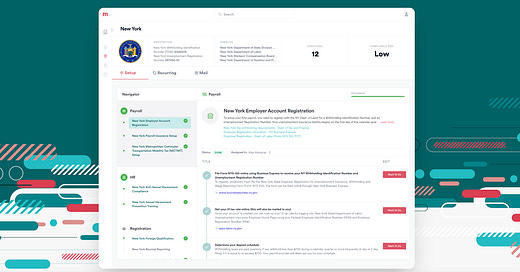Building the compliance platform for the remote work world with Mosey
Announcing Mosey’s Series A round ($18M)
I first met Alex Kehayias in 2016 as he was transitioning from his prior start-up to Stripe. From the moment I met him, it was clear that he was the rare balance of technical expert and business-minded leader - a purple squirrel, if you will. I followed his career as he led the development and launch of Stripe Atlas (the highly regarded toolkit used by 20,000+ start-ups to enable company incorporation, banking, and payment processing), and when Alex told me that he was leaving Stripe to found a company, I jumped at the chance to learn more.
It was late 2020 in the height of the pandemic and seemingly everyone was talking about collaboration tools and COVID’s impact on company culture. Alex, on the other hand, was focused on harnessing remote work’s potential to provide opportunities to more people in more places. In a word: access. He talked about why decoupling where we work from where we live was one of the most important problems to solve for the future of work.
He also suggested compliance as the answer.
When the rules to employ people are numerous and difficult, they limit the number of businesses that can support remote work and, ultimately, which jobs people can have. He posed that if we want to live in a world where work isn’t tied to where we live, we need to make it easy for the people making remote work possible. That meant navigating thousands of requirements across registration, tax, HR, payroll, and insurance.
How can compliance be made so simple that it never gets in the way again?
Enter Mosey.
Mosey is a software platform that makes remote work available to everyone by solving compliance. It (1) sets up employers to hire in a new location (read: entering a new state is hard and needs to happen in a hurry to get a new hire on payroll) and (2) enables ongoing compliance (read: staying up-to-date with directives as new regulations are rolled out is an ongoing process and when companies stop, they face steep fines).
In the 18 months since Alex shared his initial idea, I’ve seen Alex and the Mosey team launch their private beta, build a self-serve product used by real customers, and seen those customers employ thousands of employees in hundreds of different locations across the country. During that time, I had the opportunity to lead Mosey’s seed round. And today, I’m proud to announce Canaan has led the company’s $18M Series A and joined the board.
Beyond Alex’s passion, this very problem is also one he’s experienced many times. He spent years scaling remote hiring at Stripe and brings a level of expertise and founder-market fit that is rare to find. In addition, he deeply understands the intricacies of this infrastructure. That kind of intensity and depth of knowledge is crucial in solving such a longstanding challenge.
Hiring in multiple locations, whether just one contractor or thousands of employees, has never been easy. Regulations are different enough between states that they can’t be generalized and essentially force SMEs to limit their hiring to HQ. The pandemic has changed all of that as remote working has become a widely accepted norm and supporting employees in multiple jurisdictions a necessity, yet hiring remote teams remains a complex, painful, and expensive process.
The difference now is that while it’s always been hard, compliance has never been business-critical. As we move from remote work enablement to remote work permanence, hiring remotely and compliantly will become as competitive as hiring locally was before COVID. Mosey gives businesses the automation and expertise required to hire remotely and stay compliant, all for a fraction of the cost of outsourcing or building a dedicated team. For businesses weathering an economic downturn and increased compliance demands, a platform like Mosey is needed now more than ever.
Mosey has been delivering on exactly what Alex pitched in those early days of the pandemic. By solving compliance and making remote work available to everyone, Mosey is improving businesses’ ability to hire and grow, and already bringing new opportunities to more people in more places.




